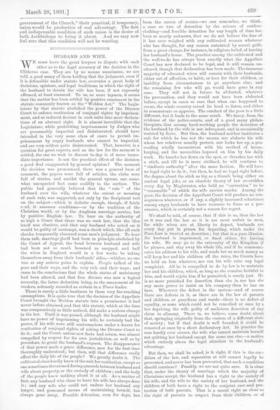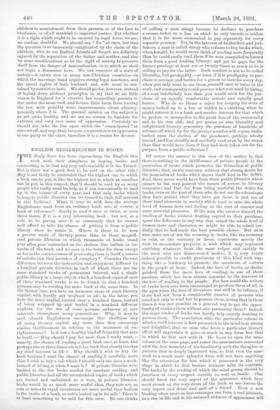HUSBAND AND WIFE.
WE must leave the great lawyers to dispute with each other as to the legal accuracy of the decision in the Clitheroe case. They are by no means unanimous, we are told, a good many of them holding that the judgment, even if it is defensible under statute law, overrules a great body of decisions, opinions, and legal traditions, in which the right of the husband to detain the wife has been, if not expressly affirmed, at least assumed. To us, as mere laymen, it seems that the matter has been settled by positive enactment in the statute commonly known as the " Weldon Act." The Legis- lature by that statute abolished the power of the Divorce Court to enforce restitution of conjugal rights by imprison- ment, and so reduced decrees in such suits into mere declara- tions of an abstract right. It is almost incredible that the Legislature, while prohibiting imprisonment by Judges who are presumably impartial and disinterested, should have intended in the very same class of cases to permit im- prisonment by angry husbands who cannot be impartial, and are very seldom quite disinterested. That, however, is a question for great experts, and as the law for the moment is settled, the one we wish to discuss to-day is of more imme- diate importance. Is not the practical effect of the decision a good deal exaggerated by general opinion P The moment the decision was pronounced, there was a general buzz of comment, the papers were full of articles, the clubs were full of stories, and amidst the general uproar, one some- what unexpected fact came audibly to the surface. The public had generally believed that the " rule " of the husband over the wife, whatever the extent or meaning of such rule, was supported, not only by the Scriptural text on the subject—which is definite enough, though, if fairly r. ad, it assumes conditions—or by the tradition of the Christian World, or by the Anglican marriage service, but by positive English law, To hear on the authority of so high a Court that there was no such law, that the idea itself was obsolete, and that any husband who acted on it would be guilty of contempt, was a shock which, like all such shocks, temporarily obscured some men's judgment. To hear them talk, marriage itself had been in principle abolished by the Court of Appeal, the bond between husband and wife had been not so much loosened as snapped, and half the wives in England would in a few weeks be taking themselves away from their husbands' sides,—whither, no one was at any serious pains to explain. People talked of the poor and their ways, and the very rich and their ways ; and came to the conclusions that the whole status of matrimony had been altered, and that free divorce was now a logical necessity, the latter deduction being, to the amazement of its readers, solemnly recorded as certain in a Times leader.
There is surely a little hastiness in these very far-reaching assumptions. It is quite true that the decision of the Appellate Court brought the Weldon statute into a prominence it had never before obtained, and that this statute, which at the time was comparatively so little noticed, did make a serious change in the law, Until it was passed, although the husband might have no power of imprisoning his wife, he certainly had the power, if his wife were still contumacious under a decree for restitution of conjugal rights, of asking the Divorce Court to do it; and the Court, unless new facts had arisen, was almost compelled by respect for its own jurisdiction, as well as by precedent, to grant the husband's request. The disappearance of that power made a grave difference, now for the first time thoroughly understood; but then, will that difference really affect the daily life of the people P We greatly doubt it. The cultivated class hardly knew of the suit for restitution, except as one sometimes threatened during quarrels between husband and wife about property, or the custody of children ; and the body of the people knew nothing about it at all, As a matter of fact, any husband who chose to leave his wife has always done ; and any wife who could not endure her husband any longer, and possessed means of maintaining herself, has always gone away. Forcible detention, even for days, has been the rarest of events—we can remember, we think, a ease or two of detention by the seizure of outdoor
clothing—and forcible detention for any length of time has been so nearly unknown, that we do not believe the fear of it has ever weighed with any cultivated woman whatever
who has thought, for any reason untainted by sexual guilt, from a great change, for instance, in religious belief, of leaving her husband's home. The practice among the cultivated and the well-to-do has always been exactly what the Appellate Court has now declared to be legal, and it will remain un- altered, though that declaration has been made. The immense majority of educated wives will remain with their husbands, either out of affection, or habit, or love for their children, or inability from circumstances to go anywhere else ; and the remaining few who will go, would have gone in any case. They will not in future be abducted, whatever the provocation, and they would not have been abducted before, except in cases so rare that when one happened to occur, the whole country raised its bead to listen, and either to remonstrate or approve. The conduct of the poor is a little different, but it leads to the same result. We fancy, from the evidence of the police-courts, and of a good many philan- thropists, that among hard-working people the desertion of the husband, by the wife is not infrequent, and is occasionally resisted by force. But then, the husband neither institutes a suit for which he has not the means, nor abducts his wife whom her relatives usually protect, nor locks her up, a pro- ceeding wholly inconsistent with his method of house- keeping, and the necessities imposed on him by his daily work. He knocks her down on the spot, or thrashes her with a stick, and till he is more civilised, he will continue to "vindicate authority" after the same fashion. He will have no legal right to do it ; but then, he had no legal right before, the dogma about the stick as big as a thumb being either an ancient legal joke, or an obsolete theory of law overridden every day by Magistrates, who hold no "correction" to be " reasonable " of which the wife carries marks. Among the poor, the decision of the Appellant Court will produce no con- sequences whatever, or if any, a slightly increased reluctance among angry husbands to have recourse to force as a per- suasive, which is certainly not a reason for regret.
We shall be told, of course, that if this is so, then the law as it was and the law as it is are most unfair to men, for while wives are at liberty to depart, husbands are every day put in prison for departing, which under the Poor-Law is treated as desertion ; but that is a pure illusion. No husband is imprisoned, or fined either, for leaving his wife. He may go to the extremity of the Kingdom if he pleases, and stay away his whole life, and if he communi- cates his address to his wife, and sends her as much money as will keep her and his children off the rates, the Courts have no hold on him whatever, nor can his wife raise any legal complaint. All he is compelled to do by law is to maintain her and his children, which, so long as she remains faithful to him, and would rejoin him if he permitted, is surely just. He is no more punished for desertion than she is, nor has she any more power to insist on his company than he has on hers. Wherever the defect in the system—and of course there are defects in it, as there are in the law of parents and children, or guardians and wards—there is no defect of equality, or none which could not be remedied at once by a law depriving the wife guilty of malicious desertion of any claim to alimony. There is, we believe, some doubt about that, springing originally from the custom of a different state of society; but if that doubt is well founded, it could be removed at once by a short declaratory Act. In practice the case hardly ever occurs, the wife who cannot maintain herself not quitting her husband except for some one else,—a motive which entirely alters the legal situation to the husband's advantage.
But then, we shall be asked, is it right, if this is the cor, dition of the law, and separation at will cannot legally be prevented, and never has been prevented, that such a condition should continue ? Frankly, we are not quite sure. It is clear that, under the theory of marriage which the majority of Christians accept, the husband has a right to the society of his wife, and the wife to the society of her husband, and the children of both have a right to the conjoint care and pro- tection of both parents. That is a moral right as clear as the right of parents to respect from their children, or of
children to nourishment from their parents, or of the Law to obedience, or of all mankind to impartial justice. But whether it is a right which ought to be ensured by legal force, we are, we confess, doubtful. We should say " No " at once, but that the question is so immensely complicated by the claim of the children, who, as our Radical friends all forget, are definitely injured by the separation of the father and mother, and also by some considerations as to the right of society to preserve itself from the danger of demoralisation, as to which we shall not begin a discussion here. We can conceive of a state of society—it exists now in many non-Christian countries—in which the marriage bond requires strong legal sanctions, and the moral rights of both husband and wife must be sus- tained by restrictive laws. We should prefer, however, instead of laying down abstract principles, to say that we see little reason in England for a coercive law compelling parents to live under the same roof, and foresee little harm from leaving the law, with possibly some improvements about alimony, precisely where it is. The general opinion on the subject is as yet quite healthy, and we see no reason to legislate for extreme and very rare cases of oppression. Certainly we should not take the line upon which the " emancipated " at once set off, and urge that, because a separation is an oppression to one party or the other, therefore it is a reason for divorce.



































 Previous page
Previous page